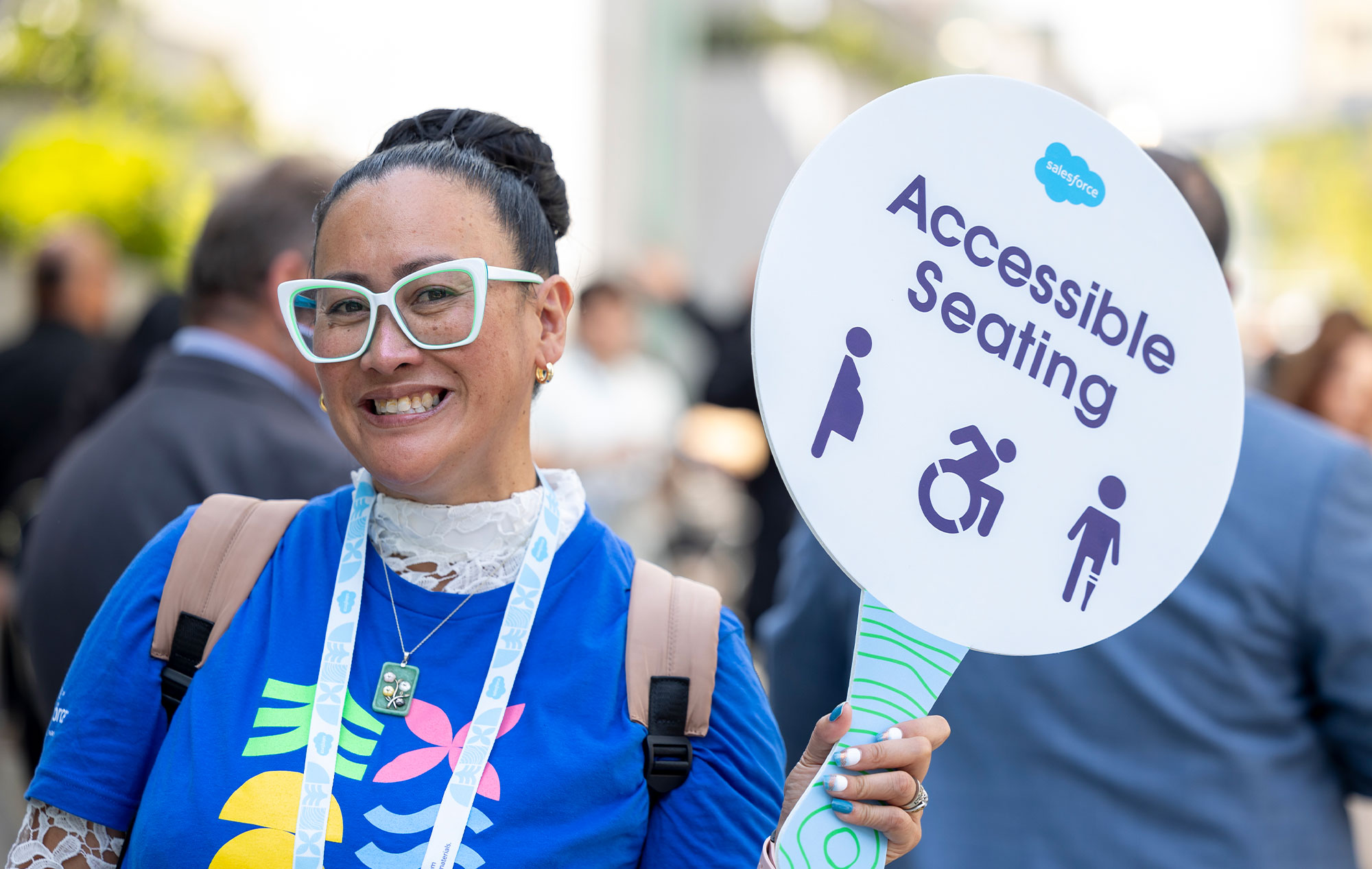The federal minimum wage may be $7.25 an hour, a rate unchanged since 2009, but the reality is many people with disabilities are being paid far less. This is due to provisions within the Fair Labor Standards Act of 1938.
In addition to providing guidelines for overtime pay and child labor restrictions, the law allows for 14(c) certificates that permit employers to pay people with disabilities far below that of the minimum wage.
In fact, there is no floor on their wages.
Many of these 14(c) certificate holders employ people with physical and intellectual disabilities in so-called “sheltered workshops” that many disability advocates consider exploitative in nature, further isolating professionals with disabilities from their non-disabled peers and the rest of society.
“Right now, if you see someone with Down syndrome working at a Goodwill, they could be making 10 cents an hour,” explains Kristian Burch, Director of Accessibility Programs and Compliance at Salesforce. “That’s not even enough to pay for their bus fare, to get to their job and back. We need to end the sheltered workshops that are provided a government designation that allows them to pay subminimum wages.”
On top of these poor hourly wages, people with intellectual disabilities are vastly underrepresented in the workforce, as well.
Twenty-one percent of working-age adults with intellectual disabilities were unemployed (twice that of the general population), while another 28% have never even held a job, according to a 2013 report conducted by the Center for Social Development and Education at the University of Massachusetts Boston.
Little has changed since.
In 2023, only 19.1% of people with intellectual disabilities were employed in the United States, compared to 61.8% of their non-disabled peers, as reported by MyDisabilityJobs.
Fortunately, the U.S. Department of Labor says Section 14(c) is currently being revised and could be “gone by the end of this administration,” Burch says.
Nonetheless, for professionals with intellectual disabilities and their families, support from educational systems and businesses remains limited—with exception to a few employers who are catalyzing change within their respective ecosystems and transforming the corporate world to be more accessible and inclusive.
Struggling to Access Equitable Education
Exclusionary experiences start early in life for people with intellectual disabilities and their families, especially in the realm of educational opportunities.
Kristian Burch is a father whose 21-year-old daughter, Karley, was born with Down syndrome, and from the beginning he wanted to ensure she was included with the rest of the children in her grade.
“We were able to really spend the first two to five years focusing on what Down syndrome meant for her,” he recalls. “And immediately, it was about inclusion. It was about inclusion in the public education system.”
However, as it is for many children with intellectual disabilities, one of the first suggestions echoed by teachers was to place Karley in a non-inclusive educational setting alongside other children with similar disabilities.
“While that's effective for some developmental areas, there's also benefits to having kids included in the general education setting,” he says. “So, for us, it was always our value to keep her fully included.”
Heather Platz is a Recruiting Solutions Strategy Manager at Salesforce and has an 8-year-old son born with Down syndrome. Her family has also pushed for greater educational inclusion for him. However, most conventional public schools aren’t well equipped to accommodate children with intellectual disabilities in a general education classroom.
“He is in first grade right now and we opted for a private school solely for the fact that he could be included in a general ed classroom,” she says. “He is the only kid in the school that has a significant disability.”
This has been a successful path for Platz’s son, in part, because Salesforce’s insurance covers his therapy needs.
While many insurance plans require a specific diagnosis to take advantage of this particular therapy, Platz is grateful that’s not the case for her son. In fact, she says the reason he’s able to go to private school is because the insurance coverage she gets through Salesforce is so comprehensive.
The insurance covers the cost of his full-time, one-on-one aide, while the rest of the tuition is funded by scholarships. “He wouldn't be able to go to a private school without any aid,” she says.
Acknowledging how blessed she feels to have an employer that prioritizes disability accommodations with its insurance benefits, Platz is aware many people with intellectual disabilities and their families encounter incredible barriers to accessing equitable education. Other families in the disability community are frequently shocked by the medical benefits her son receives, she says.
“Every few months we run into someone who can’t believe he is covered,” she continues. “That's something that we've been extremely thankful for because it's outrageously expensive. It's been very helpful with his social skills, independence, speech, and all kinds of other things.”
Nonetheless, even for children with intellectual disabilities who can get into a more integrated educational environment, they’re still regularly exposed to cultural norms or information that dehumanizes them, shares Burch.
“I remember taking our daughter to her fourth-grade class and her homeroom was a science room,” he recalls. “There was a big poster on the door and it said ‘The human body has 46 chromosomes.’ So we walked right into that classroom. What's the first thing we said to the teacher? We say, ‘She doesn't have 46 chromosomes, so your poster’s wrong.’ That's something I think about often when we discuss Down syndrome.”
Advocating for a child with Down syndrome requires constant diligence, but thanks to the Americans with Disabilities Act and evolving attitudes toward disabilities, Burch remains hopeful regarding increased accessibility.
“There are more supports available now that help people with intellectual disabilities become successful and independent,” he says. “There's a lot of really great organizations out there focused on trying to find employment for people with Down syndrome. We often see people with Down syndrome bagging groceries or working in a grocery store. Why can't we see that in a corporate setting, right? Not just picking up recycling or cleaning up after a party but actually being a part of the party.”
Working as a Professional With an Intellectual Disability
Of all business sectors, the corporate world is one of the least accessible or inclusive of professionals with intellectual disabilities. But that hasn’t prevented Thomas Luong from finding success with an accommodating working environment at Salesforce’s headquarters in San Francisco.
Starting out as an office assistant at Salesforce in 2013, he was given the opportunity to switch to Facilities Assistant this past July. In addition to conducting floor walks and compiling reports about repair needs, such as broken light switches or windows, he helps set up and clean the volunteer time off (VTO) floor, where Salesforce employees have the chance to engage in activities meant to enrich the lives of community members through education, workforce development, and climate justice initiatives, to name a few.
Luong’s attention to detail is one of the reasons manager Joseph Traylor recruited him in the first place.
“He kept texting me,” Traylor recalls. “He would always text me pictures of things that were wrong with the floors and I'm like, ‘Wow, this guy really has a niche for this,’ and then he just took off with it. So yeah, it was a great opportunity for him and me.”
Luong’s intellectual disability can sometimes make interpersonal communication a barrier, specifically speaking, which means Traylor serves as both his manager and aide, at times.
“He adds photos to his reports,” Traylor explains. “He does his comments. And part of his barrier is the trouble he has writing sentences or speaking, but I help him with his grammar and then we send his reports off to the facilities team. They basically go over the report and take action on whatever items he finds.”
Above all, Luong excels at assisting team members.
”I help them fix stuff and report to my manager if anything is wrong,” he says about his day-to-day tasks. “I always help my coworkers if they need it. If I don't understand something, I ask my manager to help me, too. I fix stuff and fill out reports. If there’s a broken window or lights, I find them and put them in the workspace area. I like to find stuff that is broken.”
His compassionate approach to work also includes a heavy dose of volunteering with his team members. VTO events are organized each quarter and Luong is “quick to jump on them,” Traylor says. “That's one way that he feels included.”
Service opportunities have included assembling hygiene kits for folks experiencing homelessness and partnering with The Arc San Francisco, a nonprofit dedicated to supporting people with developmental disabilities and their families.
As far as career growth, Luong says, “I just want to keep learning. Basically, I want to grow as a facility assistant and keep learning.”
Similarly, his advice to other professionals with intellectual disabilities is “to never give up and always keep learning.”
How Businesses Can Better Support Professionals With Intellectual Disabilities & Their Families
Common to most disability advocacy and inclusion work, better supporting professionals with disabilities and their families centers around challenging stigmas, prioritizing flexibility, facilitating disability awareness events, creating affinity groups, offering parental support, and encouraging mental health days.
Challenge stigmas. Outdated attitudes toward professionals with intellectual disabilities remain, be it the types of jobs they are limited to or the accommodations granted them in work settings, such as having an on-the-job support person or job coach.
“I think getting more people with an intellectual disability or Down syndrome working in corporate settings is a start,” Platz says. She believes a big part of that involves other professionals becoming more comfortable having support persons around, as well. “If you think about it, it's a job coach. It's one on one and maybe a little bit more time than someone else with typical job coaching.”
This would benefit other professionals with disabilities, as well, she argues, including those who are neurodivergent and already lean on job coaches to succeed in the workplace.
Prioritize flexibility. A key feature of an accessible and inclusive workplace, flexibility meets the accommodations needs of many professionals with disabilities. Whether it’s for additional doctor’s appointments or therapy sessions, employers should find as many ways as possible to make work schedules adaptable to employee needs.
This also includes offering remote work options, which enable team members to establish working environments that best meet their medical needs, which means your employees will be both happier and more productive.
Facilitate disability awareness events. These can take many shapes. The goal is to provide time and space for team members to draw attention to and educate others about intellectual disabilities.
Taking advantage of Salesforce’s generous VTO program, Platz recalls organizing an office walk for World Down Syndrome Day. Employees were encouraged to participate and donate money to organizations that are important to the Down syndrome community.
“I think that's probably where I felt the most personally supported by coworkers and leaders,” she explains. “Even people I didn't know got on board and wanted to support a cause that was important to me. It was a good education piece and a way for me to advocate just by sharing something about my life.”
Create affinity groups. Larger businesses can establish voluntary employee groups geared toward various disability issues. For instance, Salesforce has company-wide Abilityforce, helping professionals with disabilities and their allies connect around similar experiences or goals.
Alternatively, smaller enterprises or those with distributed teams may set up a Slack channel that serves a similar purpose.
“The community aspect of it” is “really beneficial,” says Burch. “It’s about having the space to build community, host events, and share stories. Parents can talk about what health benefits they're using and what resources are available through the company that other parents might not know about. We have a number of colleagues who have children with significant healthcare needs, complex healthcare needs, and I think a lot of parents from the disabilities community want to know they aren’t the only parent here.”
In fact, while Heather Platz and Kristian Burch have never worked together, they forged a fast bond through this type of disabilities advocacy work.
“We've never had any type of interaction except for my Down syndrome awareness event,” remembers Platz. “He said, ‘Hey, my daughter has Down syndrome, too.’ It was an immediate connection.”
Provide parental support. In tandem with flexible work options, creating family-friendly policies and granting parents the freedom to attend to their children with significant disabilities or medical needs lessens their burden and enables them to be better employees.
“As parents, we’re often needing to take care of our children who have intellectual or developmental disabilities,” Burch explains. “There's often a lot of medical appointments involved for physical and other areas, as well. So having the time and space available for mental health is important because being a caregiver can be very stressful at times with everything going on in the world. We want to prioritize our children.”
Encourage mental health days. Whether it’s time off for a child’s medical appointment or a much-needed mental health break, communicate to your employees the importance of time off. They shouldn’t feel guilty for taking care of their family or personal well-being.
“Karley had surgery last week, so I've had to miss a bit of work,” Burch says, highlighting the incredible value of having supportive leadership at Salesforce. “Plus, I've been trying to take time to prioritize my own mental health. Sometimes I just need a mental health day because we had a really stressful surgery a few days ago and need the space.”
Ultimately, the most effective managers are attentive to the challenges that may come up in an employee’s life, checking in with them after days taken off. Being intentional goes a long way.
“My boss knows I have a daughter who has a disability and medical care needs,” he explains. “She is very good about being proactive, saying, ‘Hey, how's your kid?’ For me, that's always been very important.”
Salesforce is a founding partner of InclusionHub, a resource for digital accessibility committed to helping businesses and organizations prioritize digital inclusion. To learn more about how your organization can better support professionals with intellectual disabilities and their families, visit Salesforce’s a11y website.






Leave a Comment